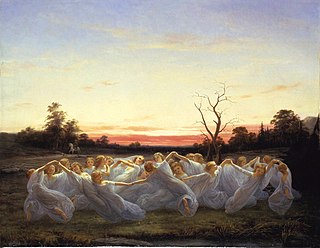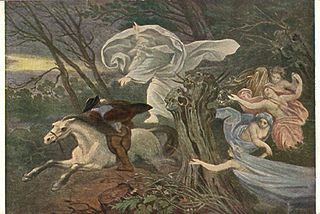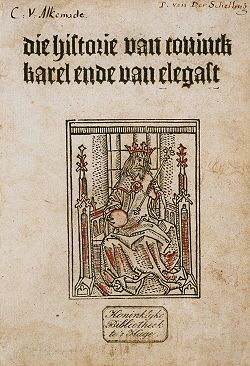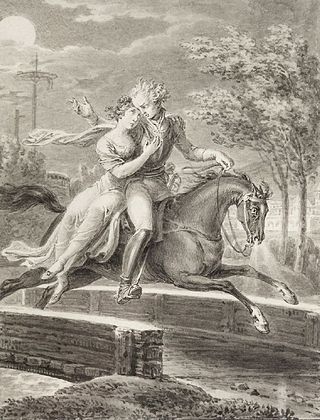
An elf (pl.:elves) is a type of humanoid supernatural being in Germanic folklore. Elves appear especially in North Germanic mythology, being mentioned in the Icelandic Poetic Edda and Snorri Sturluson's Prose Edda.

Johann Carl Gottfried Loewe, usually called Carl Loewe, was a German composer, tenor singer and conductor. In his lifetime, his songs ("Balladen") were well enough known for some to call him the "Schubert of North Germany", and Hugo Wolf came to admire his work. He is less known today, but his ballads and songs, which number over 400, are occasionally performed.

"Erlkönig" is a poem by Johann Wolfgang von Goethe. It depicts the death of a child assailed by a supernatural being, the Erlking, a king of the fairies. It was originally written by Goethe as part of a 1782 Singspiel, Die Fischerin.
The following is a list of the major publications of Johann Wolfgang von Goethe (1749–1832). 142 volumes comprise the entirety of his literary output, ranging from the poetical to the philosophical, including 50 volumes of correspondence.
"Elfenlied" is the conventional title of a 1780 poem by Goethe, and of a later poem by Eduard Mörike.
"Lady Isabel and the Elf Knight" is the English common name representative of a very large class of European ballads.

Elegast is the hero and noble robber in the poem Karel ende Elegast, an early Middle Dutch epic poem that has been translated into English as Charlemagne and Elbegast. In the poem, he possibly represents the King of the Elves. He appears as a knight on a black horse, an outcast vassal of Charlemagne living in the forest. The original Dutch poem uses the name Elegast, while translated versions of the poem commonly use the name Elbegast in German and English, or Alegast in the Scandinavian ballad.
Elves' Hill is a comedy by Johan Ludvig Heiberg, with overture and incidental music by Friedrich Kuhlau, which is considered the first Danish national play.

A Folk Tale is a ballet in three acts, created in 1854 for the Royal Danish Ballet by the Danish ballet master and choreographer August Bournonville to the music of Johan Peter Emilius Hartmann and Niels W. Gade. The first performance took place on 20 March 1854. Set in the Middle Ages, the ballet tells the story of a changeling living among the trolls and elves. Bournonville declared the ballet "The most complete and best of all my choreographic works."

Franz Schubert is a 1953 Austrian film depicting composer Franz Schubert's life and work.

"Der König in Thule" is a German poem by Johann Wolfgang von Goethe, written in 1774.

"Lenore", sometimes translated as "Leonora", "Leonore" or "Ellenore", is a poem written by German author Gottfried August Bürger in 1773, and published in 1774 in the Göttinger Musenalmanach. "Lenore" is generally characterised as being part of the 18th-century Gothic ballads, and although the character that returns from its grave in the poem is not considered to be a vampire, the poem has been very influential on vampire literature. William Taylor, who published the first English translation of the ballad, would later claim that "no German poem has been so repeatedly translated into English as 'Ellenore'".
"Der Taucher" is a ballad by Friedrich Schiller, written in 1797, the year of his friendly ballad competition with Goethe.

Hope Lies Within is an American progressive metal band from Springfield, Massachusetts, United States, formed in 2004. Hope Lies Within's current lineup consists of vocalist Uriah Rodriguez, bassist Marco Bonilla, guitarists Daniel Nawskon and Nick Egerton, and drummer Steven Padla. The band has released one studio EP entitled The Silent City and one Full Length Album entitled "Hope Lies Within".
Elvehøj is the Danish name of a Scandinavian ballad, known in Swedish as Älvefärd, type A 65 in The Types of the Scandinavian Medieval Ballad; it is also attested in Norwegian.
"Elveskud" or "Elverskud" is the Danish, and most widely used, name for one of the most popular ballads in Scandinavia.

Elverskud is a ballad for soloist, choir and orchestra by Niels W. Gade from 1854.

"Erlkönig", Op. 1, D 328, is a Lied composed by Franz Schubert in 1815, which sets Johann Wolfgang von Goethe's poem of the same name. The singer takes the role of four characters — the narrator, a father, his small son, and the titular "Erlking", a supernatural creature who pursues the boy — each of whom exhibit different tessitura, harmonic and rhythmic characteristics. A technically challenging piece for both performers and accompanists, "Erlkönig" has been popular and acclaimed since its premiere in 1821, and has been described as one of the "commanding compositions of the century".













